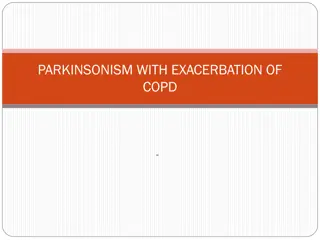Overview of Superficial Fungal Infections of the Skin
Superficial fungal infections of the skin are categorized into superficial, cutaneous, and subcutaneous types. Superficial mycoses affect the stratum corneum and include conditions like tinea versicolor, tinea nigra, and piedra. Tinea versicolor is a chronic infection caused by Malassezia furfur, wh
3 views • 31 slides
Understanding Parkinsonism: Symptoms, Classification, and Pathology
Parkinsonism encompasses a group of progressive syndromes with symptoms such as bradykinesia, tremors, and rigidity. Parkinson's Disease is the most common form, but there are various classifications including primary and secondary causes. Pathologically, it involves the loss of dopaminergic neurons
0 views • 20 slides
Understanding Parkinson's Disease: Diving Deeper into the Neurodegenerative Disorder
Parkinson's disease is a neurodegenerative disorder that impacts dopamine levels in the brain. The history, epidemiology, causes, and pathophysiology of the disease are explored, shedding light on its significant impact on the nervous system. Genetic and environmental factors play a role in the deve
0 views • 25 slides
Understanding Parkinsonism Complicated by COPD Exacerbation in an Elderly Patient
A 76-year-old male with a history of COPD and Parkinsonism presents with breathlessness, cough, and thick white sputum. Laboratory findings show increased TLC, ESR, and Neutrophils. The chest X-ray reveals mild pleural effusion. Smoking is highlighted as a possible cause of COPD exacerbation. The pa
0 views • 12 slides
Understanding Ringworm: Causes, Types, and Treatment
Ringworm, a common skin disorder known as tinea, is caused by fungi called dermatophytes. Contrary to its name, ringworm is not caused by worms but by a fungal infection. This article explores the various types of ringworm affecting different parts of the body, such as tinea corporis (body), tinea c
0 views • 26 slides




